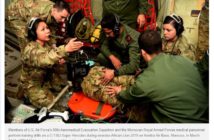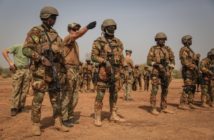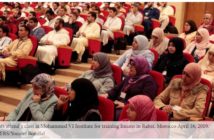The Globe Post
Kristina Biyad
He did it again. He, being political commentator Tucker Carlson and it, being another unsubstantiated rant on Fox News’ Tucker Carlson Tonight. This time, Carlson warned his viewers to run for the hills if they sense a consensus forming in Washington. Carlson’s warning included numerous unsubstantiated assertions, some of which Washington Post columnist Max Boot rebutted two days after the broadcast.
One of Carlson’s fabled assertions insinuated that Washington foreign policy experts “would rather help Morocco than protect the U.S. at the border.” What did he mean, exactly? Well, according to Carlson, the United States Africa Command (AFRICOM) operation Exercise African Lion is wasting U.S. taxpayer dollars on medical care in Morocco.
Unfortunately, it seems that Carlson is a bit confused on what exactly African Lion is – so, I figured I would clear it up for him.
Exercise African Lion
When AFRICOM was founded in 2008, they assumed sponsorship of African Lion, a joint militaryexercise between Morocco and the United States. It gives U.S. military personnel the opportunity to participate in overseas military exercises, including field and maritime training, humanitarian civic assistance, and aviation exercises.
For the past 16 years, U.S. and Moroccan military leaders have used Exercise African Lion to collaborate on counterterrorism strategies and develop an understanding of each other’s military techniques and tactics.
This year’s Exercise African Lion kicked off on March 16 and recently concluded on April 7. Since 2010, the U.S. and Morocco had invited additional military units throughout Africa and Europe to partake in the program. The 2019 exercise included units from the United Kingdom, Canada, Spain, Senegal, and Tunisia.
Where Does Medical Care Come Into this?
Well, Exercise African Lion is not necessarily about medical treatment, but that does not mean it doesn’t play some role in the operation.
Like most overseas military training operations, Exercise African Lion has a Humanitarian Civic Assistance (HCA) component. HCAs are relief and development activities carried out by U.S. military personnel during overseas training. HCA tasks cannot be carried out for solely humanitarian purposes – they must be conducted in tangent with overseas training operations, like African Lion.
Some HCA tasks include medical treatment for the local population. Throughout the years, U.S. and Moroccan personnel have provided life-saving medical treatment as part of Exercise African Lion. For example, in 2007 alone, 37 U.S. military personnel, alongside Moroccan medical personnel, treated 3,746 patients and provided 5,803 prescriptions and 833 pairs of glasses to rural Moroccans.
This HCA component can be seen essentially as a diplomatic effort aimed at easing any tensions that might arise from locals who are unhappy having a foreign military presence in their backyard.
The diplomatic effort aside, HCA components also aim to counter incidences of terrorist recruitment. The populations that HCA components aim to benefit – including those facing high levels of youth unemployment and limited access to medical care and educational services – are central targets of terrorist recruitment.
By providing efficient medical and educational services to these vulnerable communities, American and Moroccan military personnel are effectually countering the spread of extremist ideologies.
US Overseas Military Trainings
While nativist opinion might be blind to the benefits of HCA components, they may appreciate the various strategic profits that coincide with overseas military training operations.
Operations like Exercise African Lion offer U.S. reserve personnel valuable real-life on-the-ground experience. This allows U.S. military personnel to test sophisticated equipment and survey their capabilities in distinct and tactical terrains.

For example, during African Lion 2010, U.S. Marine personnel tested a ZeroBase Energy ReGenerator and SLMCO water technology. This equipment allows deployed troops to purify water and power electricity for their tents and other military equipment through solar energy. As a result, U.S. troops have been able to decrease their reliance on drinking water and generator fuel, which has, in turn, reduced the number of costly convoys required to support U.S. military operations in Afghanistan.
Besides the on-the-ground preparation that overseas military training can provide U.S. military personnel, operations like Exercise African Lion are used to promote U.S. national security and foreign policy interests abroad. Overseas military training operations are a key component of U.S. strategic assistance programming, which aims to strengthen collective security, promote U.S. values, and spread support for U.S. interests abroad.
From the U.S. perspective, African Lion serves as an opportunity for U.S. military personnel to develop a strong partnership with the militaries of cooperative nations in an effort to counter violent extremism and terrorism.
As a key U.S. ally in the Middle East, Morocco has consistently cooperated with U.S. counterterrorism efforts in the region. Using intelligence collection tactics learned from U.S. military personnel, Morocco developed the Central Bureau of Judicial Investigation (BCIJ) in 2015, which has dismantled several terrorist cells throughout the country. Just last month, BCIJ personnel arrested an Islamic State affiliate who was using his home to host improvised explosive device making workshops.
Morocco’s cooperation on counterterrorism with the United States has extended throughout the Middle East and Africa. In 2005, Morocco joined the Trans-Saharan Counterterrorism Partnership, which works with cooperative nations in West and North Africa “to address terrorist threats and prevent the spread of violent extremism.” In 2011, the U.S. and Morocco were 2 of 28 founding members of the Global Counterterrorism Forum, which aims to counter “incitement and recruitment to terrorism.”
Morocco has not only aligned its own counterterrorism policies with the U.S. and other Western allies but has also contributed its own intelligence to thwart several terrorist attacks in Europe. After the November 2015 Paris attacks, Morocco provided French police with the information that allowed them to track down the attacks’ architect, Abdelhamid Abaaoud.
U.S. and Morocco military cooperation has yielded a number of tactical benefits for U.S. reserve troops and counterterrorism efforts abroad. Providing medical care to local Moroccan populations during the annual training operation has its own benefits in and of itself but is in no way the sole purpose of the mission.
There is an overwhelming amount of reasons that one could use to criticize U.S. defense spending, but there is little weight in Carlson’s critique of strategic assistance programs like Exercise African Lion.
Unlike the 4,350 troops stationed at the U.S.-Mexico border, soldiers participating in African Lion have the opportunity to improve their tactical expertise and uphold actual U.S. national security interests.
Disclaimer: The views and opinions expressed here are those of the author and do not necessarily reflect the editorial position of The Globe Post.







